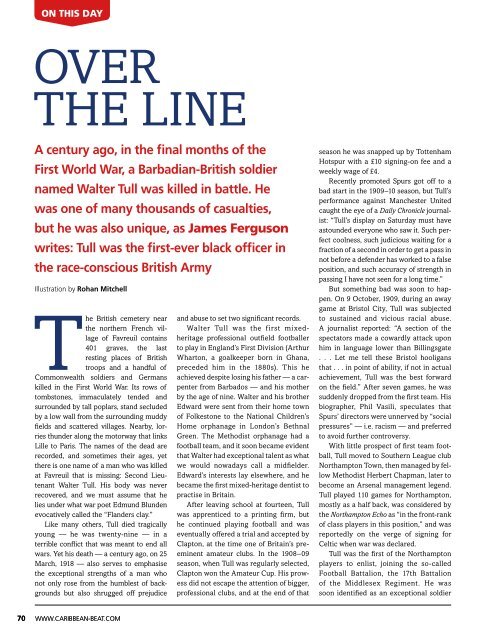Create successful ePaper yourself
Turn your PDF publications into a flip-book with our unique Google optimized e-Paper software.
on this day<br />
Over<br />
the line<br />
A century ago, in the final months of the<br />
First World War, a Barbadian-British soldier<br />
named Walter Tull was killed in battle. He<br />
was one of many thousands of casualties,<br />
but he was also unique, as James Ferguson<br />
writes: Tull was the first-ever black officer in<br />
the race-conscious British Army<br />
Illustration by Rohan Mitchell<br />
The British cemetery near<br />
the northern French village<br />
of Favreuil contains<br />
401 graves, the last<br />
resting places of British<br />
troops and a handful of<br />
Commonwealth soldiers and Germans<br />
killed in the First World War. Its rows of<br />
tombstones, immaculately tended and<br />
surrounded by tall poplars, stand secluded<br />
by a low wall from the surrounding muddy<br />
fields and scattered villages. Nearby, lorries<br />
thunder along the motorway that links<br />
Lille to Paris. The names of the dead are<br />
recorded, and sometimes their ages, yet<br />
there is one name of a man who was killed<br />
at Favreuil that is missing: Second Lieutenant<br />
Walter Tull. His body was never<br />
recovered, and we must assume that he<br />
lies under what war poet Edmund Blunden<br />
evocatively called the “Flanders clay.”<br />
Like many others, Tull died tragically<br />
young <strong>—</strong> he was twenty-nine <strong>—</strong> in a<br />
terrible conflict that was meant to end all<br />
wars. Yet his death <strong>—</strong> a century ago, on 25<br />
<strong>March</strong>, 1918 <strong>—</strong> also serves to emphasise<br />
the exceptional strengths of a man who<br />
not only rose from the humblest of backgrounds<br />
but also shrugged off prejudice<br />
and abuse to set two significant records.<br />
Walter Tull was the first mixedheritage<br />
professional outfield footballer<br />
to play in England’s First Division (Arthur<br />
Wharton, a goalkeeper born in Ghana,<br />
preceded him in the 1880s). This he<br />
achieved despite losing his father <strong>—</strong> a carpenter<br />
from Barbados <strong>—</strong> and his mother<br />
by the age of nine. Walter and his brother<br />
Edward were sent from their home town<br />
of Folkestone to the National Children’s<br />
Home orphanage in London’s Bethnal<br />
Green. The Methodist orphanage had a<br />
football team, and it soon became evident<br />
that Walter had exceptional talent as what<br />
we would nowadays call a midfielder.<br />
Edward’s interests lay elsewhere, and he<br />
became the first mixed-heritage dentist to<br />
practise in Britain.<br />
After leaving school at fourteen, Tull<br />
was apprenticed to a printing firm, but<br />
he continued playing football and was<br />
eventually offered a trial and accepted by<br />
Clapton, at the time one of Britain’s preeminent<br />
amateur clubs. In the 1908–09<br />
season, when Tull was regularly selected,<br />
Clapton won the Amateur Cup. His prowess<br />
did not escape the attention of bigger,<br />
professional clubs, and at the end of that<br />
season he was snapped up by Tottenham<br />
Hotspur with a £10 signing-on fee and a<br />
weekly wage of £4.<br />
Recently promoted Spurs got off to a<br />
bad start in the 1909–10 season, but Tull’s<br />
performance against Manchester United<br />
caught the eye of a Daily Chronicle journalist:<br />
“Tull’s display on Saturday must have<br />
astounded everyone who saw it. Such perfect<br />
coolness, such judicious waiting for a<br />
fraction of a second in order to get a pass in<br />
not before a defender has worked to a false<br />
position, and such accuracy of strength in<br />
passing I have not seen for a long time.”<br />
But something bad was soon to happen.<br />
On 9 October, 1909, during an away<br />
game at Bristol City, Tull was subjected<br />
to sustained and vicious racial abuse.<br />
A journalist reported: “A section of the<br />
spectators made a cowardly attack upon<br />
him in language lower than Billingsgate<br />
. . . Let me tell these Bristol hooligans<br />
that . . . in point of ability, if not in actual<br />
achievement, Tull was the best forward<br />
on the field.” After seven games, he was<br />
suddenly dropped from the first team. His<br />
biographer, Phil Vasili, speculates that<br />
Spurs’ directors were unnerved by “social<br />
pressures” <strong>—</strong> i.e. racism <strong>—</strong> and preferred<br />
to avoid further controversy.<br />
With little prospect of first team football,<br />
Tull moved to Southern League club<br />
Northampton Town, then managed by fellow<br />
Methodist Herbert Chapman, later to<br />
become an Arsenal management legend.<br />
Tull played 110 games for Northampton,<br />
mostly as a half back, was considered by<br />
the Northampton Echo as “in the front-rank<br />
of class players in this position,” and was<br />
reportedly on the verge of signing for<br />
Celtic when war was declared.<br />
Tull was the first of the Northampton<br />
players to enlist, joining the so-called<br />
Football Battalion, the 17th Battalion<br />
of the Middlesex Regiment. He was<br />
soon identified as an exceptional soldier<br />
70 WWW.CARIBBEAN-BEAT.COM


















